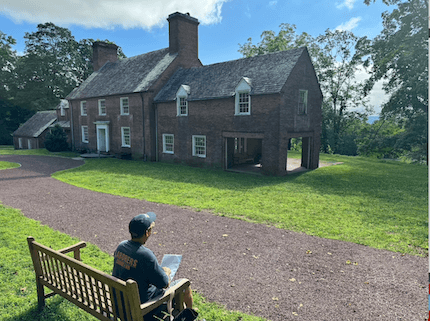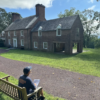
With much fanfare and an eye toward helping struggling veterans, a sleek new Rockland Homes for Heroes supportive housing complex officially opened earlier this month at the former Camp Shanks military station in Orangetown.
The 14-unit permanent supportive housing development, which aims to assist homeless veterans, was celebrated with a ribbon-cutting ceremony attended by Governor Kathy Hochul as well as other local officials and stakeholders.
The $5.4 million project received significant support from the state, which provided $4.5 million in funding. The remaining funds came from various grants and private donations, showcasing a robust community effort to address veteran homelessness.
“We have an obligation to provide essential services to our veterans who have done so much to keep our nation safe and advance the cause of freedom across the globe,” Hochul said.

The apartments offer fully furnished homes, ensuring that veterans have all the essentials, from kitchen utensils to new beds, creating a true sense of home.
Hochul’s tour of the apartments, which included exploring one of the fully-furnished units, was met with enthusiasm from the 30 attendees.
A veteran at the event who said his name was Tyler (he declined to share his last name) shared his gratitude.
“This place has given my fellow soldiers a new lease on life,” he said. “They finally have a place to call home, and it means the world to me. It’s not just about having a roof over their heads, but a sense of stability and community that I’ve been missing for so long.”
During the ribbon-cutting ceremony, Hochul said, “A $6 million project is a small price for us to pay for what these individuals were willing to pay with their lives.”
The project was developed in partnership with Rockland Homes for Heroes, a nonprofit organization dedicated to building housing for formerly homeless veterans.
John Murphy, a Marine Corps veteran and former Rockland County legislator, co-founded Rockland Homes for Heroes to help his fellow veterans reintegrate into society. He is also the co-founder of Loeb House, an organization that helps provide homes for the mentally ill.

“Homelessness is life without a future, and it breeds loneliness, despair, hopelessness, depression, and addiction,” Murphy said. “Homes for Heroes is fighting to give our veterans a chance to create a meaningful life outside of uniform.”
For nearly a decade, the organization has operated eight homes on the site, and this latest development nearly doubles the number of available units.
“We are building lifetime beautiful homes in a lovely suburban community with fellow veterans as neighbors and comrades. We are saving lives,” Murphy stated.

State funding for the project on Western Highway in Tappan came through the New York State Homeless Housing Assistance and Prevention program. The Office of Temporary and Disability Assistance contributed $3 million, New York State Homes and Community Renewal Housing Trust Fund provided $1.5 million, NYSERDA added $49,000, and M&T Bank awarded $30,000. Additionally, operating funding is being provided through the Empire State Supportive Housing Initiative.
Support services for the Homes for Heroes apartments — provided by Loeb House on-site and through other community organizations — include job readiness training, healthcare, and service coordination. This support is designed to give veterans not only have a place to live but also the resources they need to make it through the day-to-day.
This particular Homes for Heroes site is steeped in history.
The former Camp Shanks was the largest embarkation camp used by the U.S. Army during World War II, where over 1.3 million soldiers passed through on their way to Europe.

The site later became a Nike Missile base and an Army Reserve camp before being abandoned. In 2010, the military offered the 15-acre site to nonprofits willing to build housing for the homeless. Murphy, in partnership with Loeb House, leased the property, aiming to transform part of it into housing for veterans.
The new units are made available only to homeless veterans who have struggled since leaving the military.
Maria Diaz a resident of New City, expressed her support passionately.
“These soldiers fought for us, gave us a safe country and a home,” Diaz said. “It’s time these brave men are awarded the same. They deserve more than we can ever give them, and initiatives like this are just a small token of our gratitude.”
“We start with the basics and give them a home they deserve,” Murphy said in a previous interview. “The project is a testament to the community’s commitment to honoring and supporting those who have served the nation.”
On Thursday, July 11, the new Homes for Heroes units reached its capacity when the last formerly homeless veteran moved into their new home, ready to start their new life.
Click on the arrows on the pictures below to see a full slideshow of Andrea Swenson’s photos from inside and outside of the new Homes for Heroes housing units as they were being furnished.












































